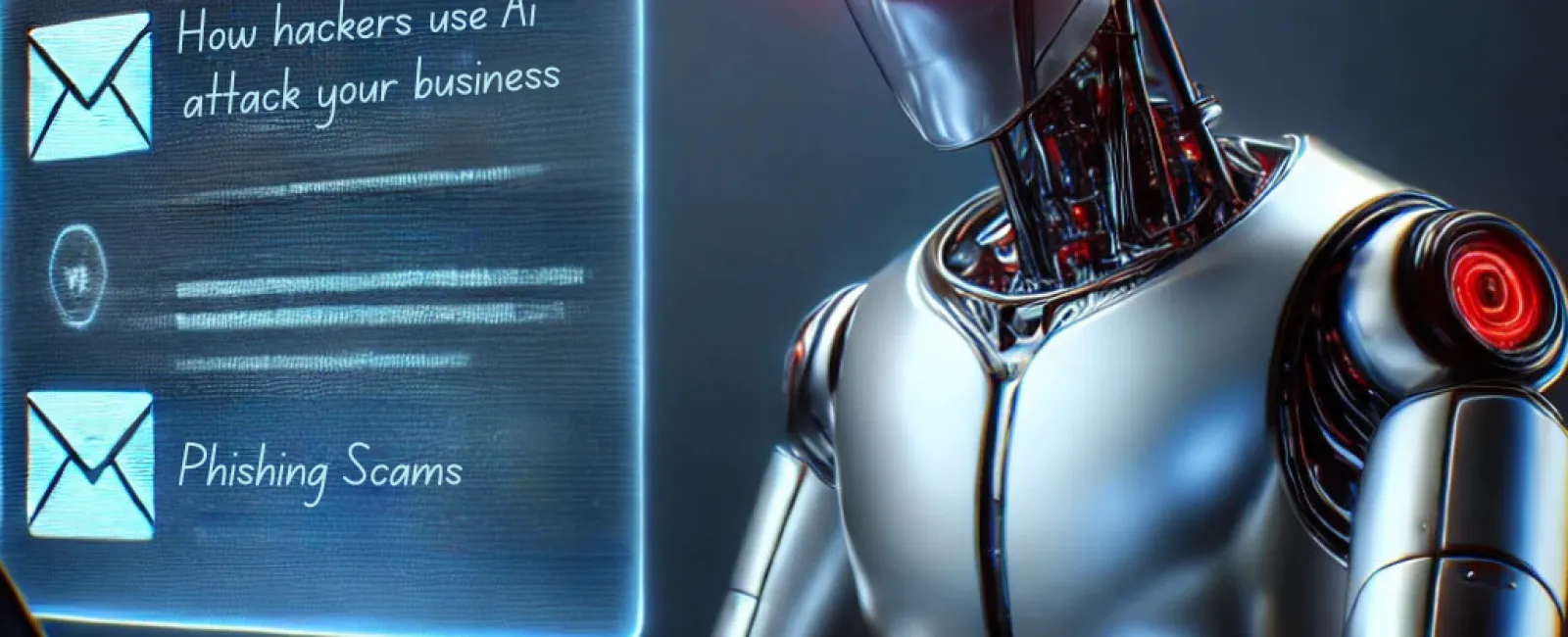January 20, 2025
If you believe that hackers are only focused on Fortune 500 companies, you're mistaken.
With the rise of artificial intelligence, cybercriminals have enhanced their ability to launch attacks, making small businesses prime targets. The reason? Cybercriminals recognize that small businesses lack the extensive resources of larger corporations but still possess valuable data that can be exploited.
Gone are the days when hackers relied on poorly crafted emails or basic password guessing. AI equips them with sophisticated tools that allow them to outsmart and outmaneuver unprepared businesses. If your defenses aren't robust, they will find a way to breach your security.
Here's how hackers are utilizing AI and, more crucially, how you can safeguard yourself from becoming their next target.
AI-Powered Phishing Scams
Traditional phishing attacks were characterized by generic, poorly written emails. You've probably encountered messages filled with spelling mistakes or grammatical errors. AI has elevated phishing to a new level with highly personalized and convincing communications tailored to specific individuals. Hackers employ AI to:
- Gather personal information from social media and business websites.
- Create emails that imitate real contacts or brands.
- Adjust language and tone to appear authentic.
For example, picture receiving an email that appears to be from your bank. It addresses you by name, includes your company name, and discusses a recent "transaction attempt" that was unsuccessful. It prompts you to "click here to confirm your information" or "update your credit card details to prevent account suspension."
Here's how the attack unfolds:
- Clicking the link directs you to a counterfeit website that looks just like your bank's login page. When you enter your credentials, hackers capture your username and password.
- Alternatively, the link could install malware on your computer, granting hackers silent access to your data, keystrokes, or even your entire network.
The outcome? Hackers gain the means to drain your account, steal sensitive business information, or launch additional attacks on your company.
Automated Vulnerability Scanning
Hackers are now using AI to automate the scanning process for vulnerabilities in small businesses. AI-driven tools can:
- Detect outdated software or insecure network configurations.
- Target these weaknesses more rapidly than ever.
Impact: Small businesses with limited IT resources often become easy targets for these automated assaults. Hackers can pinpoint and exploit vulnerabilities within minutes, gaining access to your systems before you even realize there's a problem. The result? Expensive downtime, data breaches, or even total loss of network access.
AI-Driven Malware
AI allows hackers to develop malware that can quickly evolve. These malicious programs:
- Evade detection by understanding how antivirus software functions.
- Adjust in real time to take advantage of new vulnerabilities.
Real Threat: AI-powered ransomware can now lock down systems more swiftly and demand ransoms more effectively, increasing the risk for small businesses.
Deepfake Technology For Social Engineering
AI-generated deepfake videos and audio have moved beyond Hollywood and are now tools for hackers. They use this technology to impersonate executives or trusted contacts, persuading employees to:
- Transfer funds.
- Disclose sensitive information.
For instance, imagine your CFO gets a call that sounds precisely like your CEO, complete with their tone, phrasing, and urgency. The "CEO" instructs the CFO to urgently wire funds to a vendor to finalize a significant deal. The voice is so convincing that the CFO complies without hesitation, only to later discover that the funds were sent to a fraudulent account.
Deepfakes make these schemes alarmingly credible, leaving even the most cautious employees susceptible to manipulation.
Advanced Password Cracking
AI-powered algorithms can guess passwords at incredible speeds. By utilizing techniques like pattern recognition, hackers can break even moderately strong passwords.
Tip: Multifactor authentication is no longer optional; it's crucial for combating this escalating threat.
How To Protect Your Business From AI-Powered Cyberthreats
1. Invest In AI-Driven Defenses: Utilize cybersecurity tools that employ AI to detect and respond to threats in real time.
2. Educate Your Team: Train employees to identify phishing attempts and social engineering strategies.
3. Conduct Regular Audits: Regularly evaluate your IT infrastructure for vulnerabilities.
4. Strengthen Authentication: Implement multifactor authentication and promote the use of strong, unique passwords.
5. Partner With Experts: Managed IT providers can assist small businesses in staying ahead of threats with proactive monitoring and security solutions.
AI is reshaping cybersecurity for both attackers and defenders. While hackers exploit AI to identify vulnerabilities, businesses can also harness it to strengthen their defenses. Staying informed and proactive is essential for keeping your business secure in this constantly evolving digital landscape.
Ready to fortify your business? Click here or call our office at 713-565-4832 to
schedule a FREE Schedule A Discovery Call
today to ensure your defenses are AI-proof.




